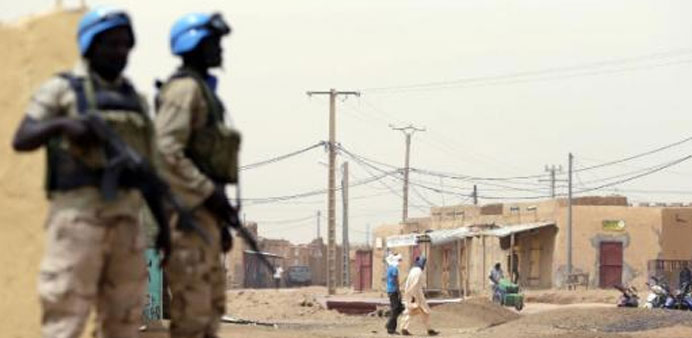Reuters/Bamako
Suspected militant fighters attacked a town in western Mali near the border with neighbouring Mauritania before dawn on Saturday, leaving up to six people dead, including two soldiers and four attackers, a town resident and an army nurse said.
A senior army officer said military intelligence and initial witness accounts indicated the attackers were militant fighters mainly from the Peuhl ethnic group.
The raid took place a week after a Tuareg-led northern rebel alliance signed a peace deal with the government aimed at ending their uprising and allowing the authorities to focus on fighting Islamist militants.
Gunfire erupted at around 5 a.m. (0500 GMT) in the town of Nara, around 30 km (19 miles) south of border with Mauritania.
A resident of Nara said gunfire could be heard several hours after the clashes began and town residents locked themselves inside their homes. Heavy fighting flared again around midday before ending in the early afternoon.
Malian security forces based in the town repelled the attack, army spokesman Colonel Souleymane Maiga said.
He had no immediate information on casualties. But a military nurse told Reuters that two members of Mali's National Guard had been killed along with four assailants and a resident said he had seen bodies lying in the streets.
"I saw four bodies of the people who came to attack and one of a Malian soldier," said resident Issa Traoré. "The last few days we've informed the military authorities about the presence of strange men in the town."
A senior army officer, who asked not to be named, told Reuters that soldiers were carrying out house-to-house clean-up operations in Nara.
He said the attackers were Peuhls infiltrated by al Qaeda in the Islamic Maghreb.
"For two days intelligence has indicated the presence of small groups of Islamists travelling in several pick-ups," he said.
A relatively new Peuhl armed group called the Massina Liberation Front, which is suspected to have clashed with government troops in the central Mopti region earlier this month, has been blamed for a growing number of attacks.
A French-led military campaign in early 2013 liberated northern Mali from al Qaeda-linked Islamist rebels, who seized control of the area after the Tuareg uprising led to a military coup that plunged Mali into chaos.
Insecurity persists however, and though the violence, often blamed on the remnants of Islamist groups, is generally focused in the desert north, attacks have in recent months crept further south.
Dozens of suspected militants attacked a police base near Mali's southern border with Ivory Coast earlier this month.

